There’s More Than One Way to Claim Victory
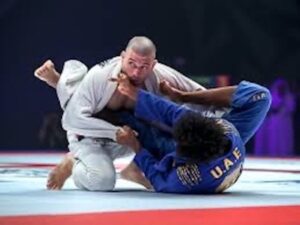
JG, a new friend I’m giving some advice to on how to grow his already successful business, wrote to me late last week. He mentioned, among other news, that he’d just returned to training Brazilian Jiu Jitsu after an absence of four weeks and, perhaps because he’d lost 16 pounds, had a great comeback training session. “There are some specific things I have done to drop weight and increase lung capacity that I will share with you when we talk,” he said.
I lost weight during my nearly four weeks in Japan, but I lost only five pounds – and I can’t say that I felt the additional energy and endurance that JG experienced. But I’d like to. Losing weight – especially if it’s fat – puts less stress on the heart and lungs and, thus, helps with endurance. And as I said on Monday, endurance is one of the most important factors for success in BJJ (and every other fighting sport I can think of). Losing weight can also make for more agility.
So I’m eager to see what JG has to show me. I’m equally eager to get below 200 pounds again. I doubt that will happen unless I get on the semaglutide train, which I’m considering. Meanwhile, I have to take my BJJ victories as they come. In very small doses.
I’ve mentioned before that the four guys I train with regularly are all national and world champions.
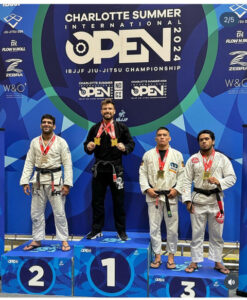
ES, the youngest of them (in his late-20s), is a multiple national title holder. I’ve been training with him since he was a blue belt at 16. I used to beat him then. I continued to have the upper hand until about halfway through his 17th year. Never since. ES is a nationally ranked black belt now, with a body fat count of about minus-5. Since he’s still a kid, I can sometimes get him laughing during training. This tactic has allowed me to score a point or two on him, but since he’s a kid, he feels like he has to give me some painful payback immediately thereafter. To avoid the drubbing, the moment I get my points, I jump up and run around the perimeter of the mat, hands raised in celebration. (I suppose he’s not the only child in those fights.)
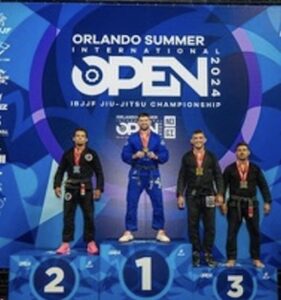
VS, his older brother (34), is on a hot streak in national and global competition, having taken gold (sometimes twice in a single tournament) in all of his last seven fights. He walks around at my weight, about 220, and fights at 208. But even at 220, he is built like Hercules. He is, however, the gentlest of the four in wrestling with me. (Jiu Jitsu is sometimes described as the “gentle” martial art.) Once, before one of his big fights, he was going especially easy on me and let me outscore him for three or four minutes. I got worried that he might be thinking he was losing his touch. So I bet him that he couldn’t pass my guard and submit me in five minutes. I knew he could, but I figured I could at least hold him off for a few minutes and a hard-fought victory over me would give him the confidence boost I imagined he needed. He asked me how much I was willing to bet. I was feeling cocky, so I said $100. He passed my guard and submitted me in 17 seconds.
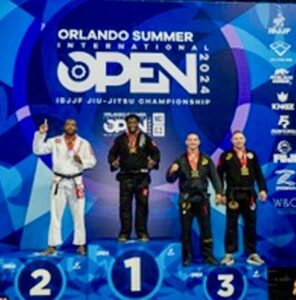
Then there is SM, another national and world champion who walks around – or so he says – at 245. Since he fights in the ultra-heavy division, he doesn’t have to weigh in. So, I – and some of the other guys that train with him – suspect he’s even heavier. In any case, SM has a slow, controlling game, which means that once he gets hold of a wrist or ankle, it’s pretty much game over. Inch by inch he puts me down, passes my guard, mounts me, and then, instead of submitting me by a choke or joint lock, as he easily could, prefers to lay his huge chest on top of my face and make me submit for fear of suffocation. He also has an annoying habit of speaking gently to his opponents as he dominates them. (“Nice try, Mark, but you know
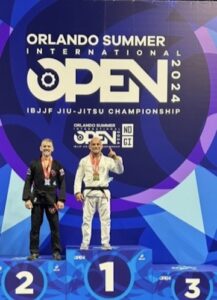
Finally, there is RT. At 50, RT is the oldest of the four. He walks around at 165 but competes at 10 to 20 pounds lighter. He’s been ranked #1 in the world for seven years running. It’s immensely stupid of me, but every time I train with RT, my brain says, “This guy has gray hair and weighs 50 pounds less than you. You are a black belt. You have won four regional titles. Surely, you can defeat him today.” I told RT about my bet with VS. He passed my guard and submitted me in 14 seconds!
You might be thinking: “Why would a 73-year-old man who has suffered two Achilles tendon ruptures, two rotary cuff surgeries, one ACL replacement, and another full knee replacement continue to train at BJJ and get his ass kicked for a solid hour four or five times a week?”
For me, the answer is simple.
BJJ is a great physical workout in every way – strength training, endurance training, flexibility training, and motor-response conditioning.
It is also a brain game that it is highly technical (much more so than, say, boxing or conventional wrestling). Each movement by your opponent sets up three or four responses you must make in less than a second or you will fall quickly behind. And each response of yours creates an equal number of possible movements on his part. In other words, Jiu Jitsu is a sport where you have to make hundreds of decisions every minute, each one in anticipation of hundreds of possible decisions your opponent makes. This is why it is often referred to as physical speed chess. (It’s also why it’s quite possible for a small and even a weak practitioner to dominate and defeat someone that is considerably bigger and stronger. And younger.)
It is rare to spend an hour or 90 minutes training without learning something new – something that might improve my “game” in some small way, or something that is cool because it’s technically interesting.
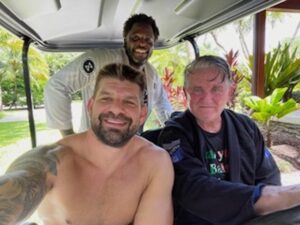
And there is a unique kind of comradery that can come with training BJJ. It is the trust that develops from constantly putting yourself in positions where your training partner could seriously hurt or kill you – except for the mutual agreement that when you “tap” on his body or the mat he will immediately desist. I think of it as a lighter version of how police or soldiers that are paired up over time begin to feel about one another. It’s hard to think of any other sport that would allow me to have this level of trust and appreciation for my teammates. It’s a casual but deep bond that runs through every type of social, physical, or psychological barrier.
Since the likelihood of my winning gold again is diminishing as I get older, I’ve concocted a way to enjoy winning vicariously. It works like this: I’ve pointed out to my training partners that every time they’ve won gold in recent years, they had trained with me – and beaten me handily – a week or two beforehand. “It might be a coincidence,” I’ve told them. “But if I were you, I wouldn’t take the chance of not doing that training with me.”
So it’s become something of a ritual. And since we began this ritual a couple years ago, my record is something like 40 and 4. And July 26, at the Orlando Open, three of my guys competed and came back with four gold medals!
I’m not saying that training with me beforehand was a deciding factor. But I’m not saying it didn’t help either.

Yeah, BJJ makes me happy. Happy from the exercise. Happy from the learning. Happy from the comradery. But also happy in a way that I thought I’d never again experience – the childhood joy of going out to play and playing and not wanting to stop at dinnertime.
